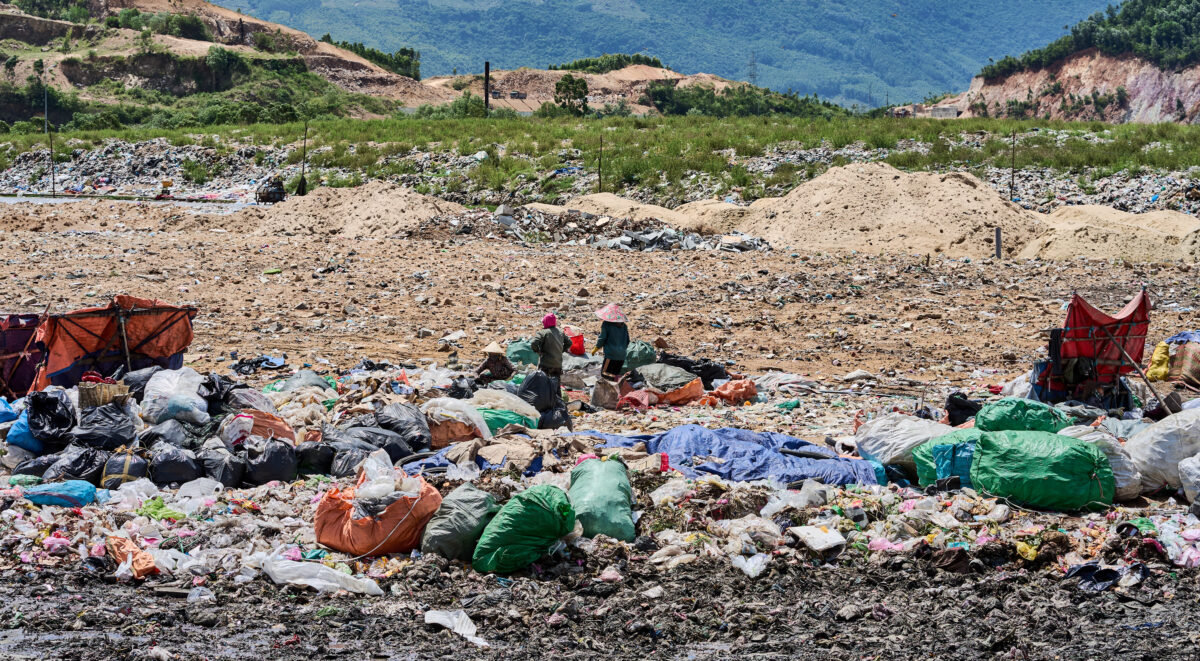
By Ellen (Van Anh Bui)
The climate movement in Vietnam is gaining momentum, driven by various factors including environmental degradation, vulnerability to the impacts of climate change, and grassroots activism.
Vietnam faces significant environmental issues such as deforestation, water, soil and air pollution (especially in urban areas), and loss of biodiversity. These issues are exacerbated by rapid industrialization, urbanization, and agricultural expansion.
A landfill in Binh Dinh.
As a low-lying coastal country with a long coastline, Vietnam is highly vulnerable to the consequences of climate change such as rising seawater level, increasing appearance of typhoons, the intrusion of saltwater into agricultural land, and the change of rainfall patterns that causes detrimental effects on agriculture. On the other hand, the nation’s unscrupulous exploitation of its natural resources (coastal, marine, biological, mineral, water, etc.) leads to severe pollution.
The Vietnamese government has acknowledged the severity of climate change and has committed to various international agreements and initiatives, including the Paris Agreement of 2015. They have set targets for reducing greenhouse gas emissions and improving environmental sustainability. According to the Emissions Database for Global Atmospheric Research (EDGAR) in 2023, Vietnam’s CO2 emissions per capita is approximately 3.3 metric tons, relatively low compared to many countries of the global North (US: 14.44, Japan: 8.61, UAE: 21.75)1.
Civil society organizations, environmental NGOs, and grassroots movements play a crucial role in raising awareness about environmental issues as well as in advocating for policy changes. Many organizations have integrated environmental conservation into their activities. Nguyen Nga Center (located in Binh Dinh), an independent organization that creates a safe and creative environment for people with disabilities, has been receiving positive feedback for its Recycle Garden (Vườn Tái chế). There, people with disabilities get the chance to make meaningful handcrafts from recycled materials, such as cloth, tin cans, plastic, etc. Some of them are trained to become skilled artisans and participate in the center’s small business.
Crafting workshop led by people with disabilities in Recycle Garden (Vườn Tái chế).
Youth-led movements are becoming increasingly prominent in Vietnam, with young people organizing protests, awareness campaigns, and educational activities to push for stronger climate action. For example, “Striped Project” is a community and an environmental project that aims to create an interactive learning space through recyclable material collection workshops. Student-led environmental projects are often connected to global youth movements, like Fridays for Future.
Despite growing awareness and activism, there are severe challenges such as limited funding for environmental initiatives, bureaucratic hurdles, and sometimes restrictive government policies on freedom of assembly and expression. In addition, many cities and provinces are not provided with adequate rubbish collection systems, causing massive problems in waste classification and treatment.
Vietnam has been actively collaborating with international organizations, foreign governments, and NGOs on climate adaptation and mitigation projects. These include funding for renewable energy projects, capacity building, and knowledge sharing. Green Change for Binh Dinh is an environmental organization that has established a collaboration with the World Bank and United Nations within the past few years. The researchers and technicians of the organization have been working with international experts to develop a new waste treatment process that later will be operated in the Binh Dinh province.
Scientists from Green Change for Binh Dinh working with students and on-site workers to develop plans for waste classification system implementation.
In conclusion, the climate movement in Vietnam demonstrates a rising realization of the critical need to confront environmental concerns and adapt to climate change, fueled by grassroots activity, government policy, and international cooperation. Vietnam may set the stage for a resilient future in the face of climate unpredictability by establishing strong legislation and encouraging an attitude of environmental stewardship. It is critical that all stakeholders, from local communities to global partners, work together effectively to protect Vietnam’s natural heritage and ensure a sustainable tomorrow for future generations.
- Crippa, M., Guizzardi, D., Pagani, F., Banja, M., Muntean, M., Schaaf E., Becker, W., Monforti-Ferrario, F., Quadrelli, R., Risquez Martin, A., Taghavi-Moharamli, P., Köykkä, J., Grassi, G., Rossi, S., Brandao De Melo, J., Oom, D., Branco, A., San-Miguel, J., Vignati, E., GHG emissions of all world countries, Publications Office of the European Union, Luxembourg, 2023, doi:10.2760/953322, JRC134504. ↩︎
